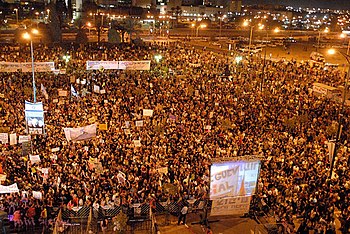 |
| Rally for social justice, Beersheba, Israel, Aug 13 2001 (Photo credit: Wikipedia) |
We don't usually think of separation of church and state as a social justice issue or regard church-state activism as a form of social justice activism. I think this is because when most of us in the U.S. think about church-state activism, we think about efforts to remove nativity scenes and Ten Commandments monuments from government buildings, return the Pledge of Allegiance to the original pre-god language, remove the god references from our currency, persuade our elected officials to stop offering sectarian prayers to open government meetings, and the like. The connection between these efforts and social justice may not be immediately apparent. And yet, I think it makes sense to think of efforts to defend the separation of church and state as a social justice issue.
The cumulative impact of the sort of church-state violations I mentioned above is that they serve to alienate non-religious persons, assuring that we continue to be marginalized. These violations collectively foster an environment of anti-atheist bigotry and discrimination. When government is not neutral on matters of religion but instead opts to promote god belief in general or Christian beliefs in particular, the non-religious lose out. It isn't just a matter of our government no longer representing us; we receive the message that we are unwanted and even despised. Negative public attitudes toward us are normalized and become socially acceptable. It is bad enough that many of our neighbors hate us; when our government behaves like this, we must begin to worry about things as basic as our safety.
How about teacher-led prayer in school, another common area of church-state activism? I think it makes sense to view parents' right not to have their children exposed to school-sanctioned prayer and/or bullied for trying to opt out of it as a social justice issue. We are quick to recognize the appalling treatment many LGBT youth face at school as a social justice issue. What many non-Christian youth face may be comparable. Perhaps this too is relevant to social justice.
Contraception and reproductive rights come to mind as another area in which separation of church and state appears to be a social justice issue. To be sure, there are secular arguments against abortion. And yet, it is fairly clear that almost all the efforts to prohibit abortion and contraception in the U.S. come from religious groups. The primary obstacle to the maintenance of reproductive rights for women appears to be the continued efforts by Christian extremists to elect politicians who attempt to legislate their backwards morality. The "war on women" about which you have heard so much is clearly a social justice issue that involves an assault on church-state separation. Strengthening the wall of separation between church and state helps to guard reproductive rights against the primary thing threatening them: the political power of Christian extremists.
The broad area of LGBT rights and same-sex marriage in particular give us yet another example. The fact that there are still states where same-sex marriage is illegal (in the way that interracial marriage used to be) and where discrimination against LGBT persons is legally permissible is another important social justice issue. The primary barrier to same-sex marriage and laws protecting LGBT persons from discrimination is the intrusion of religiously-motivated bigotry into the political realm. Again, efforts to strengthen church-state separation make it clear that the government should not be in the business of imposing religiously-motivated laws on the rest of us.
When we work to strengthen the separation of church and state, we are not merely addressing the sort of public displays of religion some dismiss as largely symbolic; we are engaging in a broad form of social justice activism that offers many benefits. Keeping our government secular reduces the marginalization, bigotry, and discrimination faced by non-Christians, women, and LGBT persons. As long as so much of the oppression faced by marginalized groups continues to be religiously-motivated, church-state separation will be instrumental to the quest for social justice. Perhaps it is time to recognize that church-state activism is a social justice issue.